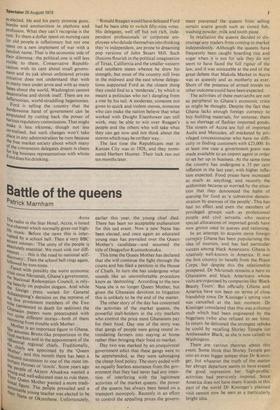Battle of the queens
Patrick Marnham Accra The radio in the Star Hotel, Accra. is tuned 13 1, a channel which normally gives out high'ire music. Before the news this is interrupted by a school bell. Then a very BBC accent intones: 'The unity of the people is abse'llitelY essential. We must sink our differences . . . this is the road to national selfci,is,c, PverY'. Then the school bell rings again, f
'mowed by tom-toms.
Faced with possibly the worst economic crisis since Nkrumah, Ghana's government, the National Redemption Council, is rely;11,g heavily on populist slogans. And while e foreign press waited for General thcheaMpong's decision on the reprieve of ,e five prominent members of the Ewe tribe (sentenced to death for sedition) the Ghanaian papers were preoccupied with s`tv° quite different stories—both of them e,Mming from trouble with Mother.
'
,_Mother is an important figure in Ghana. fone assumes Bronx-like proportions in the itrud Markets and in the appointment of the thlwentiai regional chiefs. Traditionally, Nie,,,,chiefs are appointed by the 'Queen di:'ner.. and this month there has been a ted succession to one of the most imt'h"ertant thrones or 'stools'. Some years ago You rbe°Ple of Akyem Abuakwa wanted a r.ig and well-educated man to rule them. ti:'r Queen Mother wanted a more tradiDernsal figure. The people prevailed and a thei "able Young teacher was elected to be r Nana or Okyenhene. Unfortunately,
earlier this year, the young chief died. There has been no acceptable explanation for this sad event. Now a new Nana has been elected, and once again an educated young man has prevailed over the Queen Mother's candidate—and assumed the title of Osagyefuo Kuntunkunuku.
This time the Queen Mother has declared that she will continue the fight through the courts and has filed a petition in the House of Chiefs. In turn she has undergone what sounds like an uncomfortable procedure know as 'destooling'. According to the new Nana she is no longer Queen Mother, but given the Ghanaian devotion to litigation this is unlikely to be the end of the matter.
The other story of the day has concerned the activities of the market queens, the powerful stall-holders in the city markets who control the price most Ghanaians pay for their food. Day one of the story was that gangs of people were going round intimidating farmers into staying at home rather than bringing their food to market.
Day two was marked by an unequivocal government edict that these gangs were to be apprehended, as they were sabotaging the cheap food policy. The story ended with an equally fearless assurance from the government that they had never had any intention of interfering with the legitimate activities of the market queens: the power of the queens has always been based on a transport monopoly. Recently in an effort to control the appalling prices the govern
ment prevented the queens from selling certain scarce goods such as tinned fish, washing powder, milk and tooth paste.
In retaliation the queens decided to discourage any traders from coming to market independently. Although the queens have frequently been caught hoarding rice and sugar when it is not for sale they do not seem to have faced the full rigour of the law, and it was noticeable at the end of the great debate that Makola Market in Accra was as queenly and as motherly as ever. Short of the presence of armed troops no other outcome could have been expected.
The activities of these matriarchs are not as peripheral to Ghana's economic crisis as might be thought. Despite the fact that Ghana lacks enough foreign currency to buy building materials, for instance, there is no shortage of flashier imported goods. The streets of Accra are full of imported Audis and Mercedes. all marketed by privileged concessionaires who have no difficulty in finding customers with £23.000. fn at least one case a government grant was made available to an import agent in order to set her up in business. At the same time the country has undergone a 35 per cent inflation in the last year, with highet inflation expected. Food prices have increased as much as anything, and recently the authorities became so worried by the situation that they denounced the habit of queuing for food as 'a subversive demonstration by enemies of the people'. This has had no effect and even the members of privileged groups such as professional people and civil servants who receive special allocations of imported goods have now grown used to queues and rationing.
In an attempt to acquire more foreign currepcy Ghana has been popularising the idea of tourism, and has had particular success among black Americans. Ghana is relatively well-known in America. It was the first country to benefit from the Peace Corps. but despite this the relationship prospered. Dr Nkrumah remains a hero to Ghanaians and black Americans whose visits are organised by companies like 'Black Beauty Tours'. But officially Ghana and America have not been on terms of close friendship since Dr Kissinger's spring visit was cancelled at the last moment. Dr Kissinger considered that this was a clumsy snub which had been engineered by the Nigerians (who also refused to see him). In return he delivered the strongest rebuke he could by recalling Shirley Temple (or Ambassador Black, as she is now called) to Washington.
There are various theories about this event. Some think that Shirley Temple got into an even bigger temper than Dr Kissinger, but whatever the truth of the matter her abrupt departure seems to have erased the good impression her 'high-profile' activities had previcusly inspired. Since America does not have many friends in this part of the world Dr Kissinger's planned visit cannot now be seen as a particular1, bright idea.


























 Previous page
Previous page